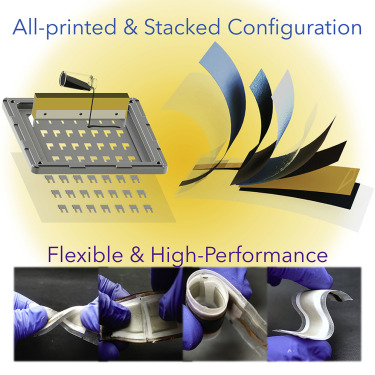University of California at San Diego researchers headlined a report with fairly astonishing news:“A flexible screen-printed rechargeable battery with up to 10 times more power than state of the art.” Combining their science with the manufacturing expertise of a hearing-aid battery maker, they have come up with a silver oxide and zinc battery that can be screen printed in normal lab conditions. Normally, such production requires a sterile environment under vacuum. So far, the battery technology seems to be limited to hearing air-sized coin cells, or in the case of UC San Diego’s work, printable displays on wearables. On smaller scales, such batteries could be used to power Internet of Things (IOT) sensors and transmitters, alerting folks when an oven kicks on or the ketchup in the refrigerator is getting low. One big question your editor has is whether this tech can successfully make electric vehicle batteries with significantly improved power and energy density to make a difference. The jointly-produced …
Battery 500 Consortium – A Budget Program with Potentially Big Payback
The federal government is creating yet another round of incentives to “spark” development of “significantly smaller, lighter and less expensive batteries.” A consortium of researchers led by Pacific Northwest National Laboratory (PNNL) will receive up to $10 million a year over five years to perk up battery performance, with the goal of creating a 500 Watt-hour per kilogram battery pack, about three times that of currently available commercial offerings. The new batteries should be “reliable, safe and less expensive,” according to consortium director and PNNL materials scientist Jun Liu. Research will come from partners nation-wide, including: Brookhaven National Laboratory Idaho National Laboratory SLAC National Accelerator Laboratory Binghamton University (State University of New York) Stanford University University of California, San Diego University of Texas at Austin University of Washington IBM (advisory board member) Even though the goals and the budget seem similar to those explained by Energy Secretary Steven Chu two years ago, his directive included research on alternative materials, such …
Transformative EV Range Expansion?
In what may be eventual good news for future electric aviators, the U. S. Department of Energy (DOE) Advanced Research Projects Agency – Energy (ARPA-E) will award approximately $36 million to 22 projects to develop transformational electric vehicle (EV) energy storage systems using innovative chemistries, architectures and designs. ARPA-E also uses the term, “revolutionary.” The series of awards is part of the RANGE program (Robust Affordable Next Generation Energy Storage Systems), intended “to enable a 3X increase in electric vehicle range (from ~80 to ~240 miles per charge) with a simultaneous price reduction of > 1/3 (to ~ $30,000). If successful, these vehicles will provide near cost and range parity to gasoline-powered ICE vehicles, ARPA-E said.” “Transformational” comes straight from the CAFE phrase book, a hoped-for direction that goes beyond evolution to revolution in what comes next. A 3X battery at 1/3 the price would certainly be transformational, especially in aircraft use, making even ultralights plausible, and Light Sport Aircraft truly functional. …
Battery Optimization: Working Smarter, Not Harder
We’re often told that we use only a small part of our brains – easily demonstrated in your editor’s case. What if we’re only using a small part of the battery power that’s available to us? Fixing that would lead to smaller batteries working more efficiently, a significant step toward lighter power packages. Hybridcars.com shares this kind of thinking in two recent postings, the first about a $4 million contract beween PARC, a Xerox company, its partner LG Chem Power and the U. S. Department of Energy’s Advanced Research Projects Agency Energy (ARPA-E) as part of the Advanced Management and Protection of Energy Storage Devices (AMPED) program. According to hybridcars’ Philippe Crowe, the partners will, “Develop a fiber optic monitoring system capable of providing detailed information about the internal condition of batteries. The end goal is to allow batteries to perform better in applications such as electric vehicles (EVs). This smart system will perform on-the-job training, learning the …

